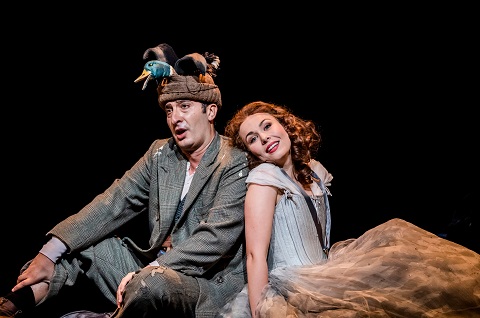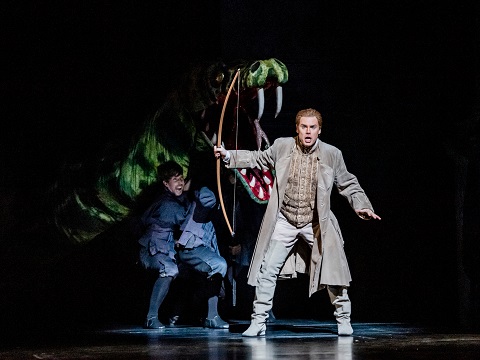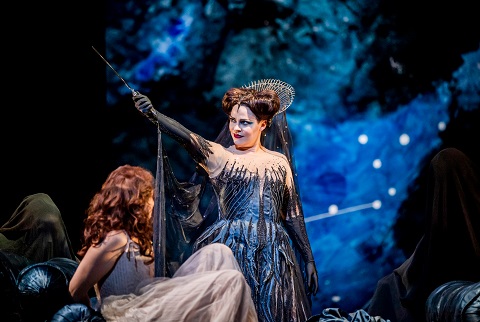
07 Nov 2019
Die Zauberflöte brings mixed delights at the Royal Opera House
When did anyone leave a performance of Mozart’s Singspiel without some serious head scratching?
English Touring Opera are delighted to announce a season of lyric monodramas to tour nationally from October to December. The season features music for solo singer and piano by Argento, Britten, Tippett and Shostakovich with a bold and inventive approach to making opera during social distancing.
This tenth of ten Live from London concerts was in fact a recorded live performance from California. It was no less enjoyable for that, and it was also uplifting to learn that this wasn’t in fact the ‘last’ LfL event that we will be able to enjoy, courtesy of VOCES8 and their fellow vocal ensembles (more below …).
Ever since Wigmore Hall announced their superb series of autumn concerts, all streamed live and available free of charge, I’d been looking forward to this song recital by Ian Bostridge and Imogen Cooper.
The Sixteen continues its exploration of Henry Purcell’s Welcome Songs for Charles II. As with Robert King’s pioneering Purcell series begun over thirty years ago for Hyperion, Harry Christophers is recording two Welcome Songs per disc.
Although Stile Antico’s programme article for their Live from London recital introduced their selection from the many treasures of the English Renaissance in the context of the theological debates and upheavals of the Tudor and Elizabethan years, their performance was more evocative of private chamber music than of public liturgy.
In February this year, Albanian soprano Ermonela Jaho made a highly lauded debut recital at Wigmore Hall - a concert which both celebrated Opera Rara’s 50th anniversary and honoured the career of the Italian soprano Rosina Storchio (1872-1945), the star of verismo who created the title roles in Leoncavallo’s La bohème and Zazà, Mascagni’s Lodoletta and Puccini’s Madama Butterfly.
Evidently, face masks don’t stifle appreciative “Bravo!”s. And, reducing audience numbers doesn’t lower the volume of such acclamations. For, the audience at Wigmore Hall gave soprano Elizabeth Llewellyn and pianist Simon Lepper a greatly deserved warm reception and hearty response following this lunchtime recital of late-Romantic song.
Collapsology. Or, perhaps we should use the French word ‘Collapsologie’ because this is a transdisciplinary idea pretty much advocated by a series of French theorists - and apparently, mostly French theorists. It in essence focuses on the imminent collapse of modern society and all its layers - a series of escalating crises on a global scale: environmental, economic, geopolitical, governmental; the list is extensive.
For this week’s Live from London vocal recital we moved from the home of VOCES8, St Anne and St Agnes in the City of London, to Kings Place, where The Sixteen - who have been associate artists at the venue for some time - presented a programme of music and words bound together by the theme of ‘reflection’.
'Such is your divine Disposation that both you excellently understand, and royally entertaine the Exercise of Musicke.’
Amongst an avalanche of new Mahler recordings appearing at the moment (Das Lied von der Erde seems to be the most favoured, with three) this 1991 Mahler Second from the 2nd Kassel MahlerFest is one of the more interesting releases.
‘And there was war in heaven: Michael and his angels fought against the dragon; and the dragon fought and his angels, And prevailed not; neither was their place found any more in heaven … that old serpent … Satan, which deceiveth the whole world: he was cast out into the earth, and his angels were cast out with him.’
If there is one myth, it seems believed by some people today, that probably needs shattering it is that post-war recordings or performances of Wagner operas were always of exceptional quality. This 1949 Hamburg Tristan und Isolde is one of those recordings - though quite who is to blame for its many problems takes quite some unearthing.
There was never any doubt that the fifth of the twelve Met Stars Live in Concert broadcasts was going to be a palpably intense and vivid event, as well as a musically stunning and theatrically enervating experience.
‘Love’ was the theme for this Live from London performance by Apollo5. Given the complexity and diversity of that human emotion, and Apollo5’s reputation for versatility and diverse repertoire, ranging from Renaissance choral music to jazz, from contemporary classical works to popular song, it was no surprise that their programme spanned 500 years and several musical styles.
The Academy of St Martin in the Fields have titled their autumn series of eight concerts - which are taking place at 5pm and 7.30pm on two Saturdays each month at their home venue in Trafalgar Square, and being filmed for streaming the following Thursday - ‘re:connect’.
The London Symphony Orchestra opened their Autumn 2020 season with a homage to Oliver Knussen, who died at the age of 66 in July 2018. The programme traced a national musical lineage through the twentieth century, from Britten to Knussen, on to Mark-Anthony Turnage, and entwining the LSO and Rattle too.
With the Live from London digital vocal festival entering the second half of the series, the festival’s host, VOCES8, returned to their home at St Annes and St Agnes in the City of London to present a sequence of ‘Choral Dances’ - vocal music inspired by dance, embracing diverse genres from the Renaissance madrigal to swing jazz.
Just a few unison string wriggles from the opening of Mozart’s overture to Le nozze di Figaro are enough to make any opera-lover perch on the edge of their seat, in excited anticipation of the drama in music to come, so there could be no other curtain-raiser for this Gala Concert at the Royal Opera House, the latest instalment from ‘their House’ to ‘our houses’.
"Before the ending of the day, creator of all things, we pray that, with your accustomed mercy, you may watch over us."

When did anyone leave a performance of Mozart’s Singspiel without some serious head scratching?
This seventh revival of David McVicar’s Die Zauberflöte, first shown in 2003 and now rebooted by Bárbara Lluch, is no less gloomy or plausible in its narrative. Thankfully, its exploration of Enlightenment values, and its narratives of morality and power, are all given a light dusting and freemasonry is all but erased in this dark and occasionally enchanting production.
The glowing orbs carried through the stalls at the start of the Overture signal where we’re heading, not necessarily plot-wise but more by suggestion in terms of emotional trajectory. Ancient superstitions are abandoned for reason and a partnership of equals emerges after several testing ordeals for Tamino and Pamina whose joyful union is ultimately celebrated. Sounds cosy, but notions of power and equality propounded by Mozart’s librettist Emanuel Schikaneder are merely ideals, and in that sense, we’ve not come very far since Viennese audiences first heard this musical fairy-tale in 1791.
 Benjamon Hulett (Tamino). Photo credit: ROH/Tristram Kenton.
Benjamon Hulett (Tamino). Photo credit: ROH/Tristram Kenton.
The work’s underlining solemnity is balanced by gentle humour, generated not so much by the accoutrements of popular theatre presented here - a wriggling serpent, the rubber chicken or the air-borne bicycle - but by the characters themselves, principally the comic exchanges between Vito Priante’s engaging Papageno and Elsa Dreisig’s spirited Pamina. Their partnership is more convincing than any other on stage and enjoys a special camaraderie nowhere more obviously than in the companionable duet ‘Bei Männern, welche Liebe’ - sung with effortless musicality and glorious tone and connected by a real chemistry - a bond that, had he been a tenor, Priante and Dreisig would have made a believable married couple-to-be. Benjamin Hulett’s ringing Tamino is fervently and cleanly delivered: a strong wholesome and safe-as-houses tenor arrives in ‘Wie stark ist’, but the unvarying nobility of stance and textbook movements never quite draw the eye. Tamino’s betrothal to Pamina is a plot convenience, but here manages to look more manufactured than usual simply because the rapport is missing and it’s not just Mozart’s fault.
The composer conceived the work for a theatre in a Viennese suburb for a popular audience used to family entertainment. That he elevated this Singspiel to more lofty dimensions isn’t an issue here, more the absence of any sense of wide-eyed wonder in a shadowy production that stems as much from the drab colours (even the wild animals look anaemic) as the unimaginative direction, and where singers at times are almost overwhelmed by the sheer enormity of the surrounding marble columns. These crowd the stage to oppressive effect and merely highlight the post-war pallor of the costumes. Spectacle is there, of course, such as the giant moon and sun, but it needs more than a lick of paint to liven up proceedings within these, often empty, cavernous spaces. 18th-century frock coats, pretty dresses and a shabby suit for a mallard-wearing Papageno don’t quite remind us that this opera shares elements with pantomime.
 Elsa Dreisig (Pamina) and Tuuli Takala (Queen of the Night). Photo credit: ROH/Tristram Kenton.
Elsa Dreisig (Pamina) and Tuuli Takala (Queen of the Night). Photo credit: ROH/Tristram Kenton.
Niggles aside, I enjoyed the absence of distracting movement during many of the set pieces, allowing key arias and ensemble numbers to register fully, to speak for themselves as it were. Particularly memorable was the wonderful Act Two Terzett ‘Soll ich dich’, beautifully rendered, buoyant and sung with flawless ensemble and genuine affection - a standout moment of pure bliss. Elsewhere, the trio of Ladies (Kiandra Howarth, Hongni Wu and Nadine Weissmann) eventually found an accommodation in their ensembles, a quality brought off with great assurance by the three boys Richard Wolfson, Joshua Abrams and William James who made the most of their cameo roles.
There is plenty of drama from the Finnish soprano Tuuli Takala as an admirable Queen of the Night. Her arias blazed with conviction and brought sustained applause for her efforts. Equally impressive, and at the other end of the stave, is the commanding presence and amply upholstered bass of Andres Bauer Kanabas as Sarastro. His shapely ‘O Isis und Osiris’ was especially gratifying. So, too, was the clarion and insinuating tone from Rodell Rosel as a foppish Monostatos - less a repellent monster than someone to be ridiculed. It was curious to see Papagena dressed as a woman belonging to the oldest profession, but Chilean soprano Yaritza Véliz fulfilled her portrayal with ease.
Leo Hussain directs the Royal Opera House Orchestra with flair, bringing flexible and generally forward tempi. Despite the odd disagreement between pit and stage the opening night was a musically persuasive evening and will sharpen up in time.
David Truslove
Tamino - Benjamin Hulett, Papageno - Vito Priante, Queen of the Night - Tuuli Takala, Monostatos - Rodell Rosel, Pamina - Elsa Dreisig, Sarastro - Andres Bauer Kanabas, Papagena - Yaritza Véliz, First Lady - Kiandra Howarth, Second Lady - Hongi Wu, Third Lady - Nadine Weissmann, First Boy - Richard Wolfson, Second Boy - Joshua Abrams, Third Boy - William James, Speaker of the Temple - Darren Jeffery, First Priest - Harry Nicoll, Second Priest - Donald Maxwell, Men in Armour - Andrés Presno & Julian Close; Director - David McVicar, Conductor - Leo Hussain, Revival Director - Bárbara Lluch, Designer - John Macfarlane, Lighting - Paule Constable, Movement Director- Leah Hausman, Revival Movement Director - Angelo Smimmo, Orchestra and Chorus of Royal Opera House.
Royal Opera House, Covent Garden, London; Friday 1st November 2019.